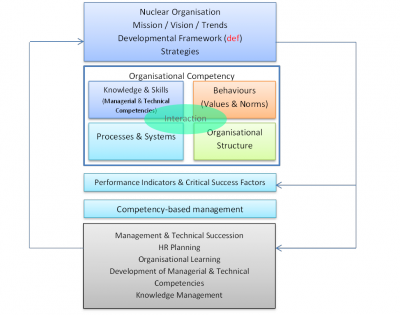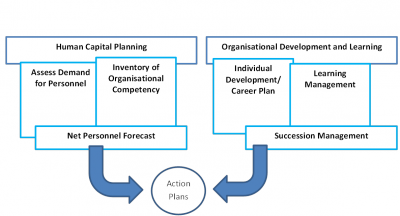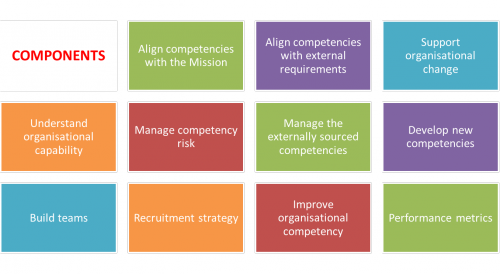Difference between revisions of "Competency management"
m |
|||
| Line 78: | Line 78: | ||
[[Competency Map]] | [[Competency Map]] | ||
| − | [[ | + | [[Organisational competency mapping]] |
[[Category:Business processes]] | [[Category:Business processes]] | ||
[[Category:Exemplar]] | [[Category:Exemplar]] | ||
Revision as of 08:32, 2 August 2013
Contents
Definition
A collection of processes used to identify and evaluate the current strengths and needs as well as predict the future needs within an organisation and finally to implement the required corrective actions.
Summary
One paragraph
Description
Competency management in the management system
Competency management is a part of a management system. Figure 1 summarises the integration of competency management into a management system (developed based on [1]).
Figure 1: Organisational Competency interaction
Mission, vision, strategies
Competency management aligns competencies with mission, vision and strategy of the organisation.
Organisational competency
The four elements of organisational competency and their interaction is described in the article on Organisational competency
Performance indicators and critical success factors
Competency based management
Figure 2 summarises the interface between competency based management and KM (developed based on [1]).
Figure 2: Competency Based Management – KM Interface
Essential components of competency management
Figure 3 summarises eleven items an organisation must take care of in order to manage its competencies well.
Figure 3: Components of good competency management
Organisational competencies should be aligned with the mission, vision, strategy and business processes of the organisation. The typical methods to acchieve this include creating a scheme of competencies and long-term workforce plan based on the mission, vision and strategy and using the national workforce plan.
Organisational competencies should also be aligened with external requirements and regulations. The typical methods to acchieve this include forming an independent governance and audit committee, integrated quality management system, nuclear safety committee, maintaining and reviewing the minun staffing required for safe operation (Nuclear baseline) and implementing a management of change process.
An organisation should support the processes of organsational change and transformation by aligning the competencies with the new requirements. This includes developing a forward looking business plan, employee development policy, strategy and plan and a change management plan.
An organisation should understand its own organisational capability e.g. by creating and maintaining a human capital index.
Managing competency risks is an essential part of competency management. The typical methods for acchieving this include creating a map of competency risks at the levels of department, business unit, function or organisation, creating a risk-based competency retention plan followed up with knowledge retention and transfer actions and creating a long-term workforce plan, substitution plan (short term) and a succession plan (long term).
An organisation should manage its externally sources competencies which includes maintaining the capability to outsource, ensure that outsourced capabilities are maintained and managing the risk to outsourced competency. The typical methods to acchieve this include developing "Intelligent customer" roles and an outsourcing policy to manage outsourced competency.
Organisation should develop its technical and functional competencies. The typical methods acchieving this include performing job-task analysis, maintaining role and training profiles, having a process for performance assessment and appraisal, analysing learning needs, evaluating the impact of learning, developing a competency development programme which includes e.g. coaching, centoring, craininga and directed reading.
An organisation should also Build teams and team level competencies as a part of its competency management. The methods for acchieving this typically include maintaing and using the organisational structure chart, creating and maintaing, individual and team role and task descriptions, creating and promoting networks and nommunities and using the business Unit plans.
Developing a recruitment strategy supports importing new competencies. The typical methods for acchieving this include developing a recruitment process and plan and having processes for reassignment, redeployment and job rotation.
Organsiations can also improve their competencies through benchmarking. The typical methods for acchieving this include improving job descriptions and role profiles, restructuring posts, processes and systems based on the found good practices.
Developing organisational performance metrics is a way to evaluate the the effect of competencies on performance. The typical methods for acchieving this include developing performance assessment and evaluation methodologies.
References
[1] S. Gardielliano, Intergative Organizational Competency - A practical and cost-efective model.



